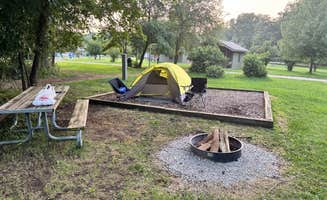Tent camping near Lake Forest, Illinois provides options within driving distance of the northern Chicago suburbs. The region offers a mix of county-managed campgrounds and state parks, situated among Midwestern deciduous forests and small lakes. Summer camping season typically runs May through October, with temperatures ranging from 50-85°F during peak months.
What to do
Nature trails access: Camp Shabbona Woods offers several hiking paths through restored prairie and woodland areas. Trails range from 0.5 to 2.5 miles in length, making them suitable for casual hikers. A camper noted that the site is "set up very well for first time campers or new people interested in trying out camping."
Water recreation options: Woodland Melody Park Campground in Twin Lakes provides access to Lake Mary for fishing and small watercraft launching. The campground's location on East Lakeshore Drive places campers within 400 feet of water access points.
Wildlife viewing opportunities: Kishwaukee Valley Farms attracts birdwatchers and wildlife photographers seeking to document native Illinois species. The farm setting creates unique habitat edges where woodland and agricultural areas meet.
What campers like
Clean facilities: Campers consistently mention the maintenance standards at established sites. At Camp Shabbona Woods, reviewers appreciated that "caretakers were very helpful and did a great job keeping the campground clean." Bathrooms are noted as well-maintained despite the urban setting.
Staff responsiveness: Camp staff at local sites receive positive mentions for addressing camper needs promptly. One reviewer highlighted the "friendly" staff at Camp Shabbona Woods, which enhances the camping experience for visitors unfamiliar with the area.
Proximity to Chicago: The best tent camping near Lake Forest, Illinois allows urban residents to experience camping without extended travel. Campgrounds in this region serve as convenient weekend destinations, requiring drives of typically 30-60 minutes from northern Chicago neighborhoods.
What you should know
Urban setting limitations: Most campgrounds near Lake Forest feature background noise from nearby development. As one camper at Camp Shabbona Woods observed, campers "definitely felt the urban community close by with ambulances and firetrucks noises in the background."
Site restrictions: Gate closure policies affect arrival timing at several locations. At Camp Shabbona Woods, gates close at 10 PM, which one camper described as "weird but overall ok."
Limited shade coverage: Recently developed camping areas feature younger trees that provide minimal shade. One reviewer mentioned Camp Shabbona Woods "campgrounds do not have a lot of shade as new saplings are still growing."
Seasonal availability: Most tent camping near Lake Forest operates seasonally, with Woodland Melody Park's season running May 1 through October 15. Weekends in July and August typically require reservations 2-4 weeks in advance at most established campgrounds.
Tips for camping with families
First-time camping opportunities: The developed nature of sites makes them appropriate for introducing children to camping. Camp Shabbona Woods is described as being "set up very well for first time campers," with facilities that accommodate families new to outdoor experiences.
Vehicle proximity restrictions: Families with young children should note parking policies. At Camp Shabbona Woods, you "can't keep your vehicle close to your campsite," requiring planning for transporting gear and supplies.
Weather preparation: Due to limited shade at newer campgrounds, families should pack extra sun protection during summer months and be prepared for temperature variations typical of the Midwest region.
Tips from RVers
Hookup limitations: RVers should note that many campgrounds near Lake Forest lack electrical and water hookups. Camp Shabbona Woods has "no electric or water hook ups," requiring self-containment for RV camping.
Size restrictions: Most camping areas near Lake Forest accommodate smaller recreational vehicles rather than large rigs. Access roads and parking pads are typically designed for moderate-sized campers and trailers under 30 feet.


